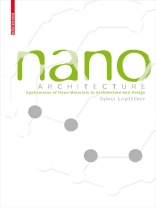Nanotechnology is widely regarded as one of the twenty-first century’s key technologies, and its economic importance is sharply on the rise. In architecture and the construction industry it has potentials that are already usable today, especially the coating of surfaces to lend them functional characteristics such as increased tensile strength, self-cleaning capacity, fire resistance, and others. Additives based on nanomaterials make common materials lighter, more permeable, and more resistant to wear. Nanomaterials are not only extremely useful for roofs and facades; they also expand design possibilities for interior and exterior rooms and spaces. Nano–insulating materials open up new possibilities for ecologically oriented architects.
In this book, with a foreword by nobel prize winner Harold Kroto, architects, interior designers and designers will find an introduction to the scientific background specifically tailored to their needs, a critical discussion of the advantages and limits of the technology, and above all a comprehensive presentation of sixteen characteristics and functions of nanomaterials that are specially relevant for building and design, illustrated by numerous international project examples.
Dipl.-Ing. interior designer BDIA Sylvia Leydecker is a practicing interior designer with her own firm in Cologne, 100% Interior. She represents the BDIA (Bund Deutscher Innenarchitekten, or Union of German Interior Architects/Designers) on the Architektenkammer Nordrhein-Westfalen (Chamber of Architects of North Rhine-Westphalia), serves as an instructor for a number of Architektenkammer academies, and is a member of the Kompetenzzentrum Nanotechnologie CC-Nano Chem (Competence Center for Chemical Nanotechnology, or CC-Nano Chem) and the Institute of Nanotechnology, or Io N, in Scotland. Numerous lectures and journal publications on the subject of nanotechnology in architecture, interior design, and design.
表中的内容
Contents
Foreword by Harry Kroto
Foreword by Michael Veith
What is nanotechnology?
The development of nanotechnology
Carbon – new morphologies
General market developments
Nanoproducts
Form Follows Function?
Ecology and economics
Is the devil in the dwarfs?
Nanotechnology and product design
Functions and applications
Self-cleaning: Lotus-Effect®
Ara Pacis Museum, Rome
Commercial building, Pula
Private residence, Aggstall
Strucksbarg housing, Hamburg
Self-cleaning: Photocatalysis
Muhammad Ali Center MAC, Louisville, Kentucky
Hyatt Regency Osaka Garden Chapel, Osaka
Narita International Airport of Tokyo, Chiba
AKT – Am Kaiser’s Turm, Heilbronn
east Hotel, Hamburg
G-Flat, Tokyo
Private residence, Osaka
Private residence, Hyogo
House in Creek, Hiroshima
Disabled-access sheltered housing for elderly people, Frick
MSV Arena soccer stadium, Duisburg
Children’s playground, Kagawa
Easy-to-clean (ETC)
Science to Business Center Nanotronics & Bio, Marl
Kaldewei Kompetenz-Center, Ahlen
Private residence, Erlenbach
Modern Classicism, Shanghai
Urban lounge / Light bubbles, St. Gallen
Air-purifying
Atelier and villa for a calligrapher, Ymanashi
Paving for Leien Boulevard, Antwerp
Jubilee Church, Rome
Anti-fogging
Fragrance capsules
Thermal insulation: Vacuum insulation panels (VIPs)
Sonnenschiff centre, Freiburg
Seitzstraße residential and commercial building, Munich
Thermal insulation: Aerogel
County Zoo, Milwaukee, Wisconsin
School extension, London
Sports hall, Carquefou
Factory, Zaisertshofen
Temperature regulation: Latent heat storage, phase change materials (PCMs)
‘Sur Falveng’ sheltered housing for elderly people, Domat/Ems
UV protection
Solar protection
Fire-proof
Deutsche Post headquarters, Bonn
Waverley Gate, Edinburgh
Anti-graffiti
New Centre Ulm
Hofjäger Palais, Berlin
Anti-reflective
Antibacterial
Housing estate, Duisburg
Operating theatre, Goslar
Operating theatre, Berlin
Patients’ hospital room prototype, Berlin
Anti-fingerprint
Scratchproof and abrasion-resistant
Holistic application of nano surfaces
Acknowledgements
People
Trade fairs, conferences and events
Sources and further information
Illustration credits
关于作者
Die Autorin, Dipl.-Ing. bdia, AKG Sylvia Leydecker, gilt als eine der führenden Innenarchitektinnen in Deutschland und ist mit ihrem Büro 100%interior in Köln, auf das Gesundheitswesen spezialisiert: Die Projekte sind mit diversen internationalen Awards ausgezeichnet. Sie war ehrenamtliche Vizepräsidentin des bdia (Bund Deutscher Innenarchitekten) und Boardmember der IFI (International Federation of Interior Architects/Designers). Zahlreiche Vorträge und Zeitschriftenpublikationen über zukunftsorientierte Innenarchitektur und auch das Thema Nanotechnologie in Architektur, Innenarchitektur und Design.












